Are you struggling to find an effective way to engage your target audience and boost lead generation? What about creating quizzes — aka surveys? When used correctly, this type of interactive content helps businesses achieve higher engagement than contests, giveaways, and ordinary email campaigns.
Here are five quiz ideas to get you inspired. Check them out and design your very own quiz to draw the audience’s attention to your brand.
Quizzes for combating choice overload
Do you offer a great variety of similar products? Some of your website visitors likely experience the overchoice effect, put simply:
- shoppers visit your website intend to buy a product;
- they discover a great variety of products and get overwhelmed due to the many potential outcomes and risks that may result from making the wrong choice;
- they decide to leave your website empty-handed instead of taking the risk.
If you want to minimize the negative effect of the overchoice phenomenon, you should create a quiz — aka a survey — to help your customers choose the right product with ease.
Here is an example of how a world-famous cosmetic brand uses this strategy to engage customers and increase sales.
DS Laboratories is a company that offers a wide range of hair growth stimulating products. Since most people do not know how to choose the right shampoo, DS Laboratories designed a Hair Assessment quiz. The quiz helps customers find the product that perfectly matches their needs in a few clicks.
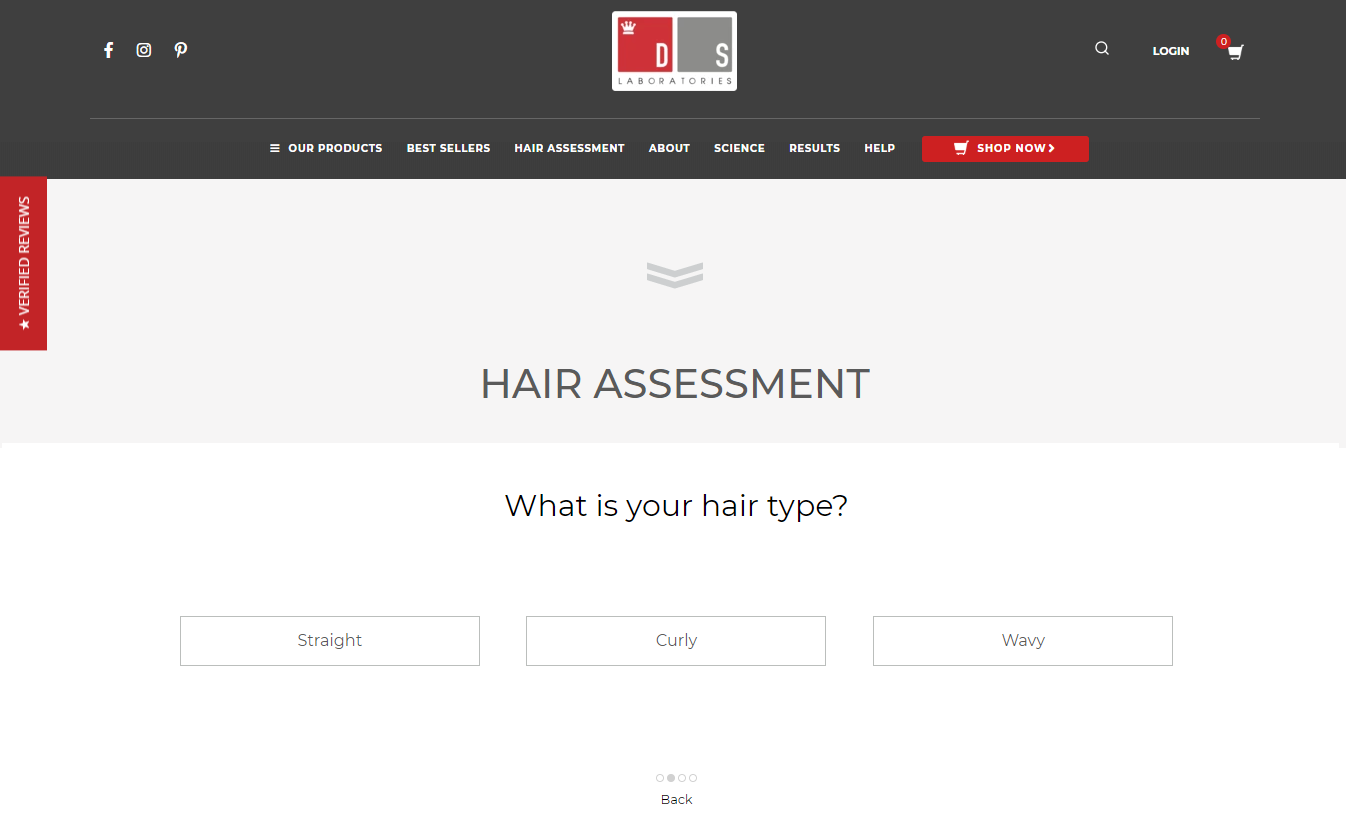 DS Laboratories invites website visitors to take a hair type quiz to discover a suitable hair product
DS Laboratories invites website visitors to take a hair type quiz to discover a suitable hair product
Think about how you can help your customers make more informed buying decisions. Create a quiz that will guide them through your website and help them find the right products.
Recommendation quizzes
Have your customers already bought some products from you? That’s great! Now you should design a recommendation quiz and offer your customer a few extra products.
Using a quiz, you can provide your customers with product recommendations based on what they want and need right now, just as Libro.fm Audiobooks did it in its lead nurturing email.
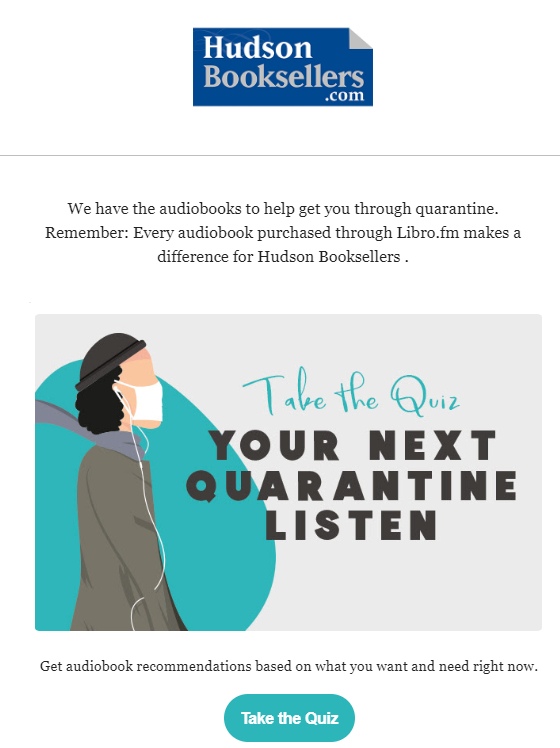 Libro.fm Audiobooks invites customers to take a quiz to get audiobook recommendations
Libro.fm Audiobooks invites customers to take a quiz to get audiobook recommendations
The quiz includes questions like “Are you in the mood for a classic?” and “How is your attention span these days?” It allows the platform to analyze the current mood of audiobook listeners and provide the most accurate and relevant recommendations.
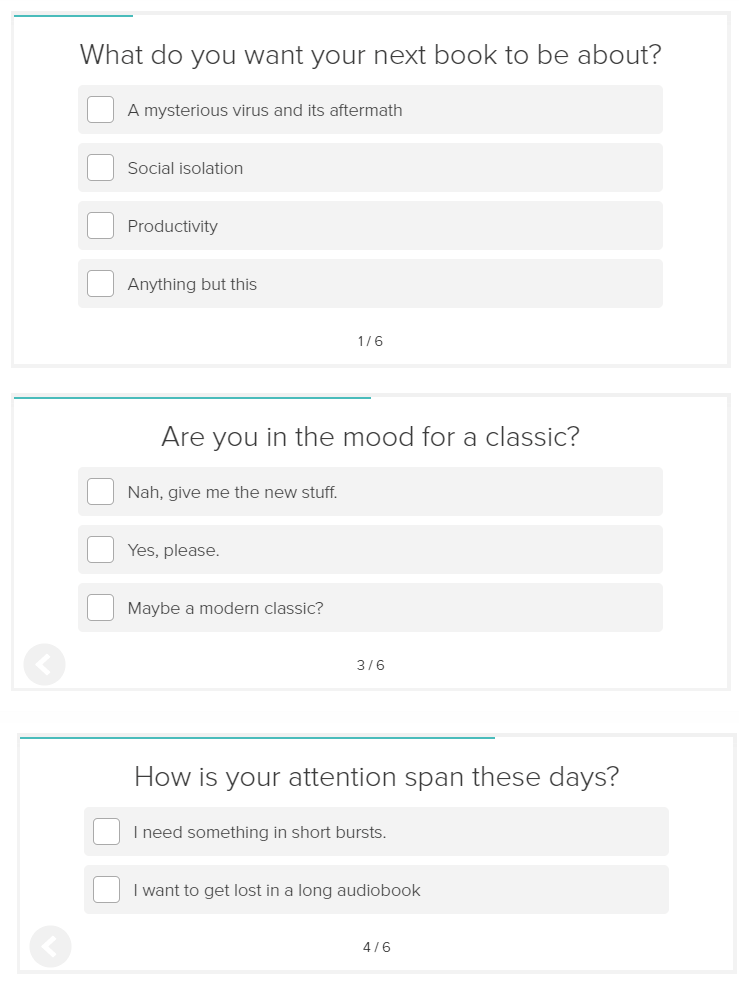 Quiz questions for defining the current preferences of audiobook listeners
Quiz questions for defining the current preferences of audiobook listeners
The quiz will help you engage your target audience better than ordinary personalized emails that include product recommendation sections like “You may also like these products.” Why do quizzes provide higher-quality engagement? Great question.
Firstly, statistics show that interactive content gains two times more engagement than static content. Secondly, people trust the results of quizzes more than AI-based product recommendations — scientific studies show that people are averse to relying on recommender systems.
If you are looking for new ways of leveraging personalization in your marketing strategy, try to create a product recommendation quiz. It will allow you to connect with your customers on a deeper level and improve brand loyalty.
Inspiration quizzes
Do you want to optimize your website for lead generation? Design a quiz that will grab attention but not heavily promote your products.
Have you ever wondered how to warm up potential customers and get them on their way to making a purchase? Dive into our post on
lead generation tips to find out more!
Here is an example of such a quiz. Booking.com offers its website visitors to find the best beach destination that matches their personal preferences.
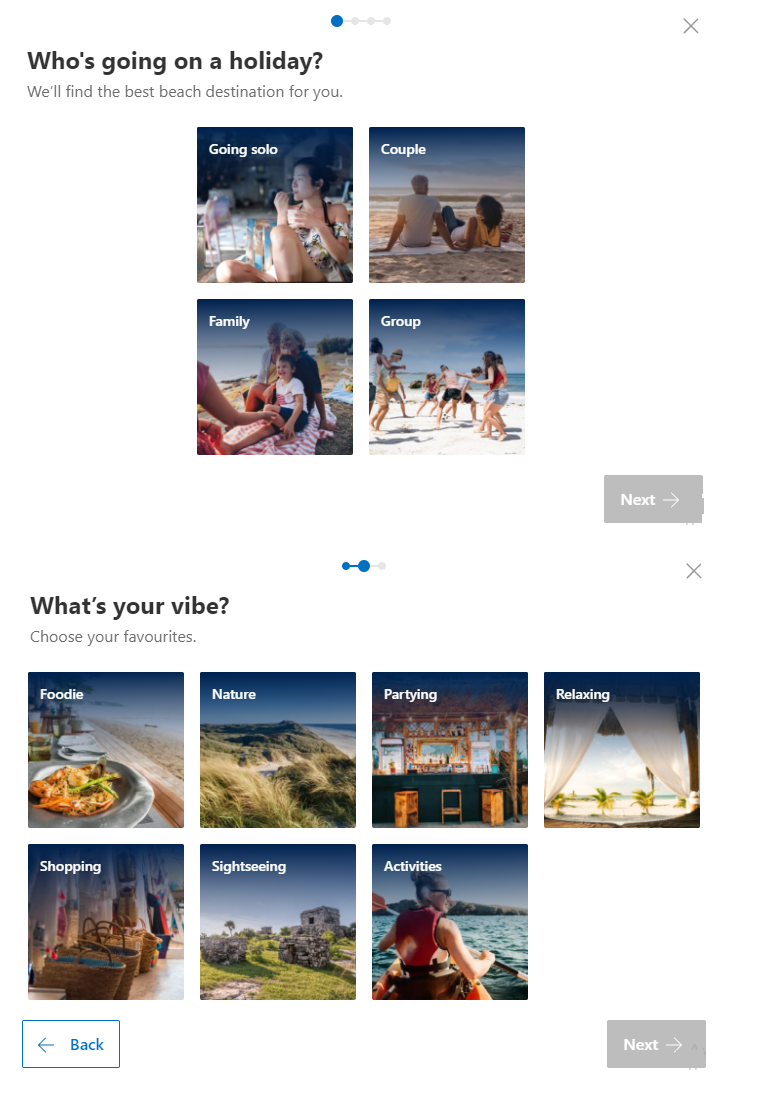 Booking.com illustrated the answers to the quiz questions to engage more users
Booking.com illustrated the answers to the quiz questions to engage more users
The quiz includes three simple questions. All of the answers are illustrated with relevant images. It takes a quizee less than a minute to take the quiz and get the results.
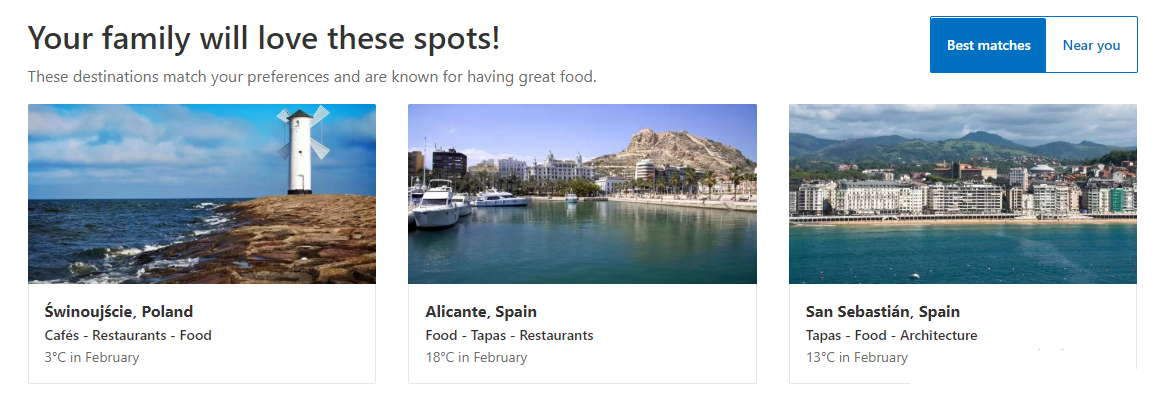 The results of the quiz “Find your next beach holiday destination with Booking.com”
The results of the quiz “Find your next beach holiday destination with Booking.com”
Does this quiz encourage users to book a specific hotel? Does it promote any special deals? Nope. The purpose of this quiz is to help website visitors find inspiration for planning their next trip and motivate them to use Booking.com in the future.
In other words, you shouldn’t expect that quizzes will help you achieve immediate results and skyrocket your sales. But you can expect that this type of interactive content will allow you to collect more leads and accomplish your long-term goals.
Personality quizzes
Have you ever used personality quizzes in your marketing campaigns? You should try it out!
Humans are curious creatures. They like to take personality quizzes. It’s interesting for them to find answers to such questions as “Which Marvel hero are you?” and “What kind of milkshake are you?”
Here is an example of a personality quiz designed by Booking Business. It invites users to find their business travel personalities.
 Booking Business invites users to take a “traveler type” quiz
Booking Business invites users to take a “traveler type” quiz
The quiz includes eight simple questions related to business trips. Each question comes with five answer options.
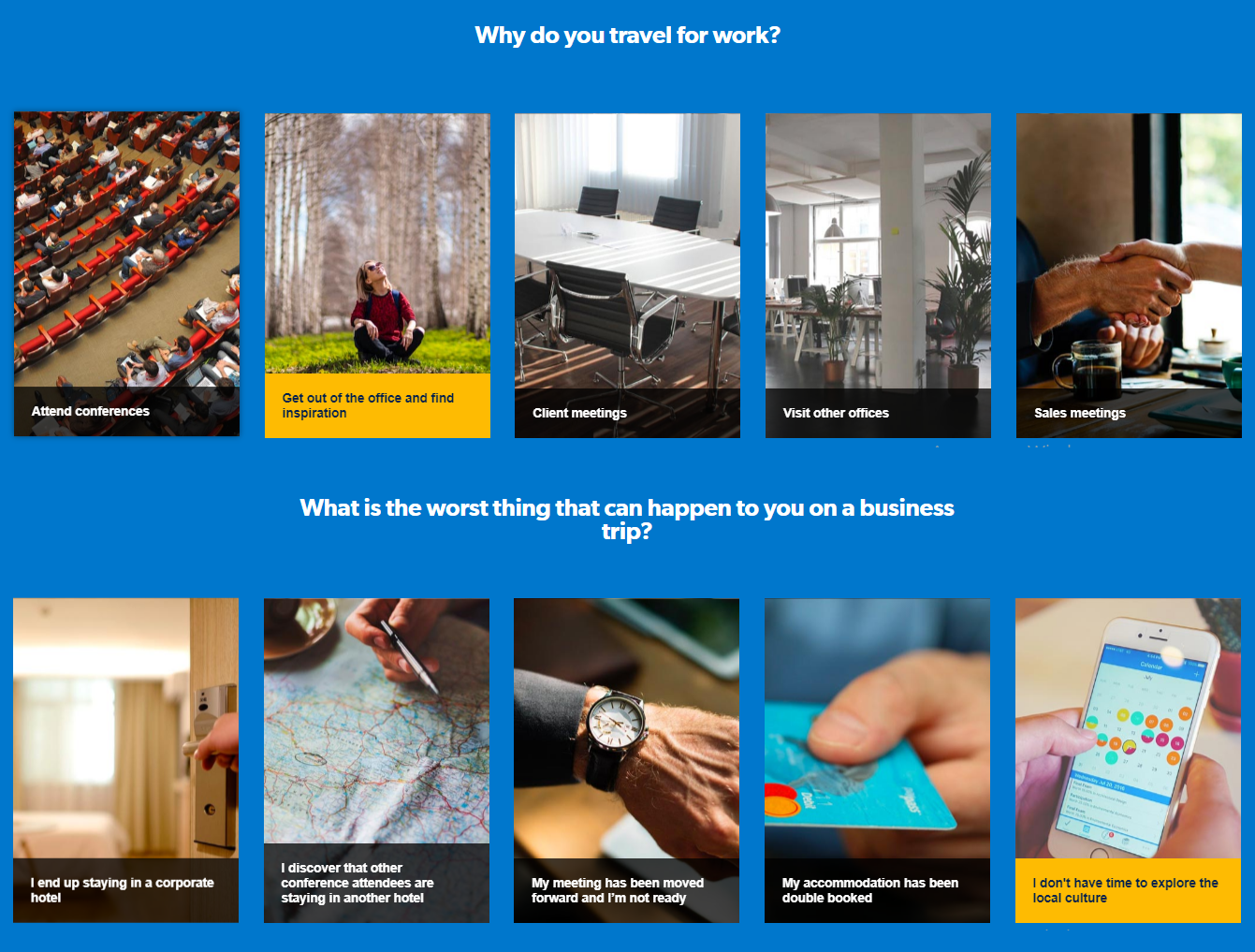 Questions of the “traveler type” quiz
Questions of the “traveler type” quiz
The quiz defines business travel personalities and invites quiz players to take the second step — provide their contact data to find perfect accommodation.
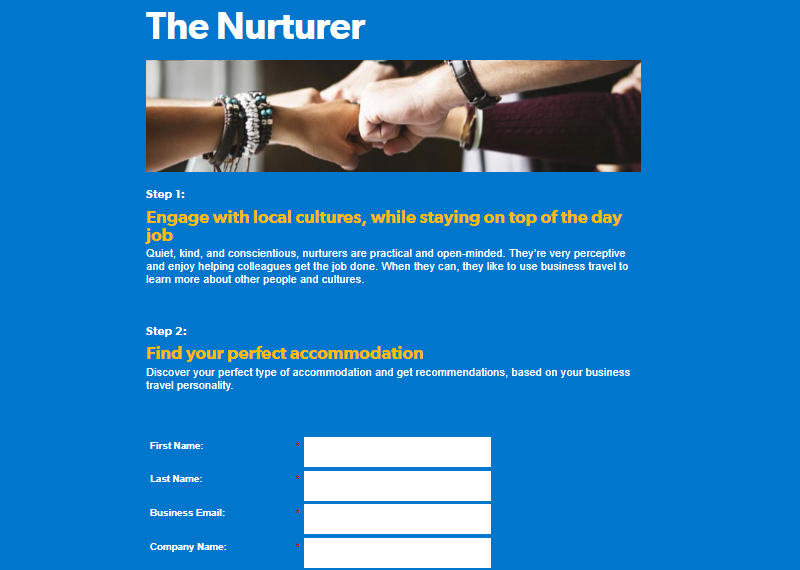 The results of the “traveler type” quiz and a lead generation form
The results of the “traveler type” quiz and a lead generation form
A personality quiz is a universal marketing tool. You can use it to better understand the preferences of your target audience and create a personalized customer experience.
Community-building quizzes
Human beings are social creatures who have a strong need to belong. All your customers have a fundamental motivation to be accepted into relationships with others and be a part of social groups. And guess what? You can use it to your advantage.
You can build a community in your niche and use quizzes to collect leads. For instance, if your target audience is students who use flashcard databases like Subjecto, you can create a group on Facebook and run quizzes exclusively for that demographic. You can tap into students’ sense of belonging to boost engagement and improve brand loyalty.
Let’s consider an example to understand how modern companies use this approach.
The Telegraph invited its email subscribers to participate in a live pub quiz on Facebook.
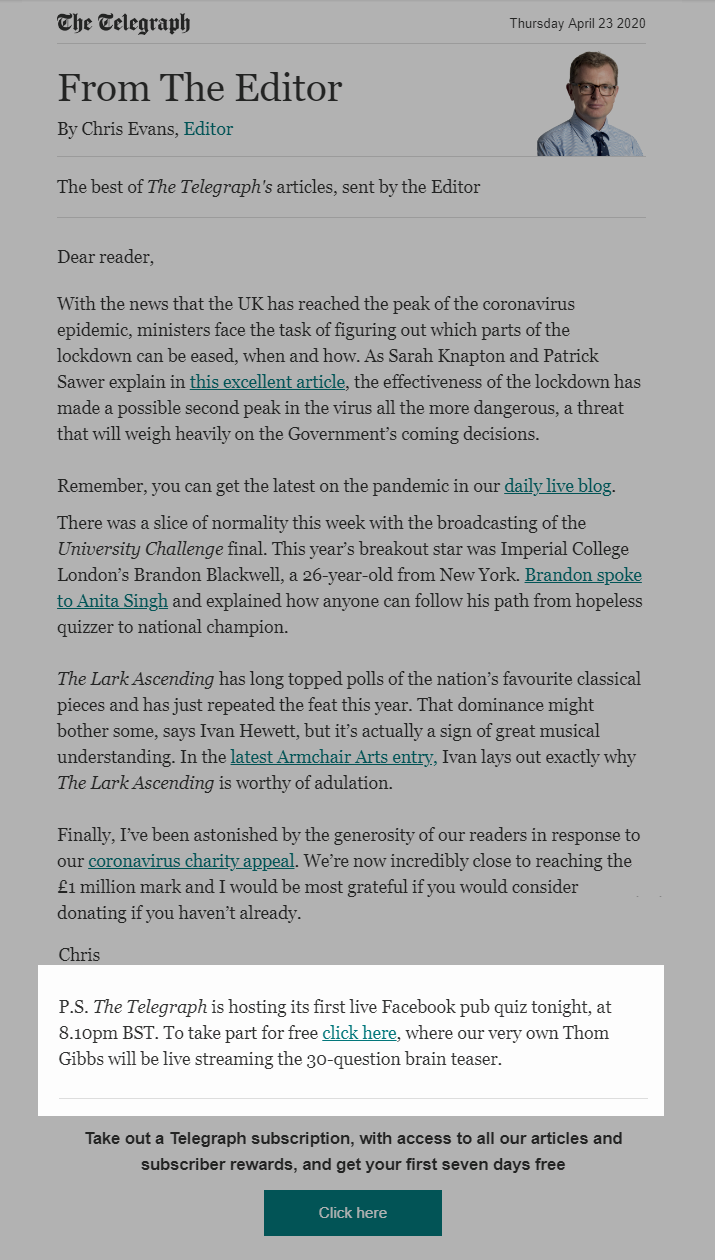 The Telegraph invites its email subscribers to participate in a live Facebook pub quiz
The Telegraph invites its email subscribers to participate in a live Facebook pub quiz
More than 16,000 users viewed the first live pub quiz. The quiz encouraged a competitive spirit in leads and helped strengthen the community of The Telegraph’s audience.
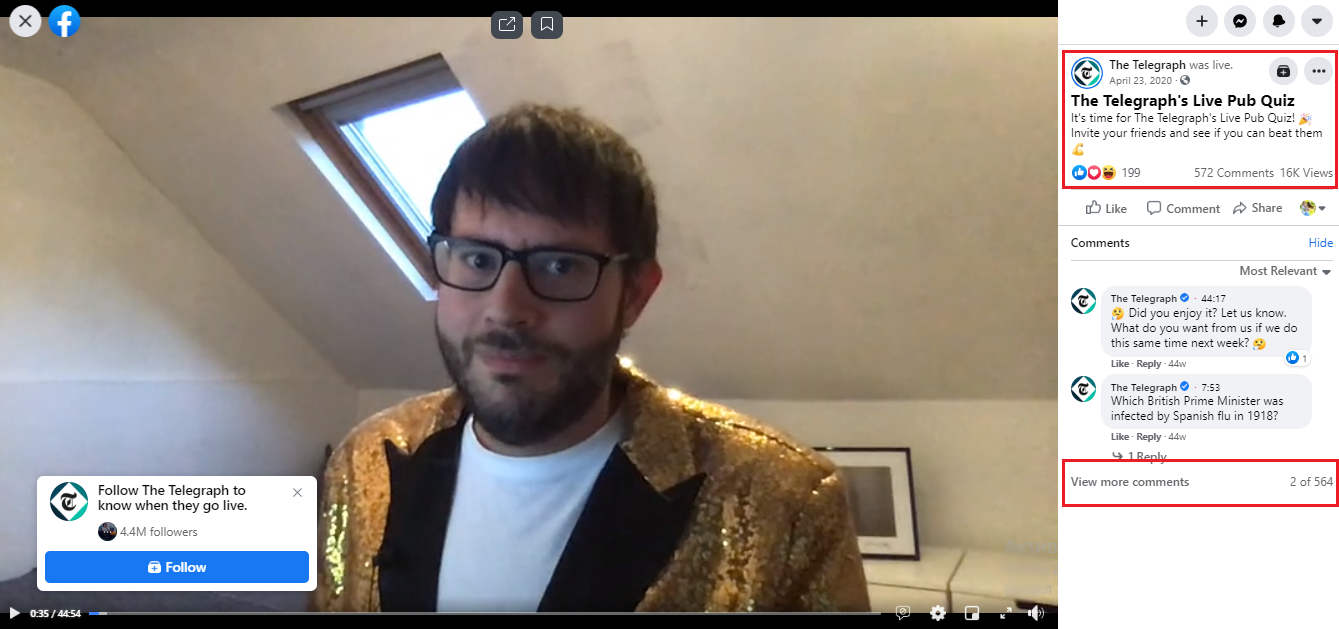 The Telegraph’s first live pub quiz
The Telegraph’s first live pub quiz
This type of quiz will work well for B2B companies. If your target audience are experts in a specific niche, for instance SEO experts, you can invite them to participate in an SEO quiz and discuss the results with their peers. It will allow you to build a community around your brand and get the support you need.
7 tips for getting the most out of quizzes
Do you want to create a perfect quiz? Do the following:
- Set a marketing goal before you start creating your quiz. Answer the questions, “What specific results do I want to achieve by using this quiz?” Your goal may sound like these options: “collect 1,000 leads within three weeks” or “increase Facebook engagement by 30% in a month.”
- Strive to add value for your target audience. Make your quiz fun, interesting, and be sure the results of the quiz are useful and relevant. For instance, you can help new customers to choose a product that will perfectly meet their needs.
- Craft an irresistible title. Try to find the right words to intrigue your target audience and increase the quiz participation rate.
- Don’t add too many questions to your quiz. The attention span of modern users is short, so the more questions you ask, the fewer users will finish your quiz.
- Keep questions short and simple. Otherwise, you will scare your leads away.
- Make your quiz look visually appealing. Use readable fonts, add visuals.
- Promote your quiz across all available platforms. Use social media to drive traffic to your website and vice-versa.
Here is one more quiz example for you. Swatch regularly runs quizzes in their Instagram Stories. The company uses its Facebook account and its website to promote the quizzes and collect more leads. Consider using the same approach to reach a wider audience.
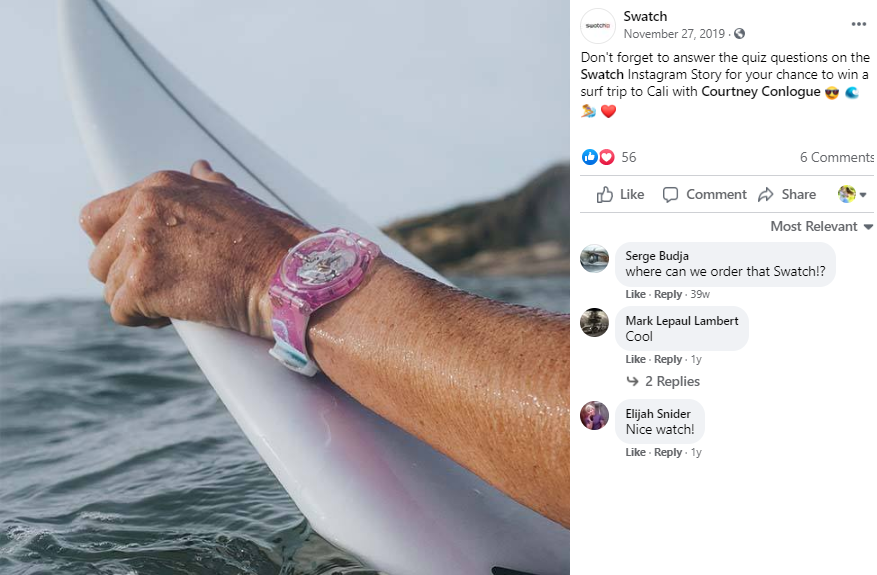 Swatch promotes its Instagram Story quiz
Swatch promotes its Instagram Story quiz
Wrapping it up
Have you gotten inspired by these quiz ideas? Now it’s time for you to analyze your target audience’s wants and needs to design a quiz that perfectly fits your brand.
Leverage quizzes and other interactive content in your marketing strategy, and you will achieve outstanding results.